- Home
- Joseph Heller
Almost Like Christmas
Almost Like Christmas Read online
Almost Like Christmas
Joseph Heller
Copyright
The characters and events in this book are fictitious. Any similarity to real persons, living or dead, is coincidental and not intended by the author.
Copyright © 2013 by Joseph Heller
Used by permission of the author’s estate
Cover design by Keith Hayes
Cover copyright © 2016 by Hachette Book Group, Inc.
Hachette Book Group supports the right to free expression and the value of copyright. The purpose of copyright is to encourage writers and artists to produce the creative works that enrich our culture.
The scanning, uploading, and distribution of this book without permission is a theft of the author’s intellectual property. If you would like permission to use material from the book (other than for review purposes), please contact [email protected]. Thank you for your support of the author’s rights.
Mulholland Books / Little, Brown and Company
Hachette Book Group
1290 Avenue of the Americas, New York, NY 10104
mulhollandbooks.com
twitter.com/mulhollandbooks
facebook.com/mulhollandbooks
First ebook edition: December 2016
Originally published in The Strand Magazine, 2013
Mulholland Books is an imprint of Little, Brown and Company, a division of Hachette Book Group, Inc. The Mulholland Books name and logo are trademarks of Hachette Book Group, Inc.
The publisher is not responsible for websites (or their content) that are not owned by the publisher.
The Hachette Speakers Bureau provides a wide range of authors for speaking events. To find out more, go to hachettespeakersbureau.com or call (866) 376-6591.
ISBN 978-0-316-36115-6
E3-20161031-JV-PC
Contents
Cover
Title Page
Copyright
Almost Like Christmas
About the Author
Mulholland and Strand Magazine ebook shorts
Newsletters
Almost Like Christmas
Joseph Heller
The coffee was gone again. Mercer swore softly, tiredly, and carried the coffee pot to the basin. He moved slowly. His eyes were red and he ground them mercilessly with the heels of both hands while the percolator was filling. He needed a shave now, and the total relaxation of his heavy face gave him the hopeless, stupid, waxen look of a drunkard. Carter sat limply at the large pine table and watched him, scarcely seeing him in his own fatigue. It had been a long night, he was thinking, a fantastically wicked, confused, and diabolical night, and it was only just beginning.
He watched Mercer start back across the room and stop at the window to stare out glumly at the entrance to the hospital across the street. The chill fog outside had streaked the glass with drippings of mist that gleamed like cheap jewelry in the light from the naked yellow bulb in the room. The window was dirty, and each time that Carter’s eyes fell on the coarse patterns of grime he was reminded of photographs of diseased tissue that he had seen a long time before in Life magazine. They had been drinking coffee for hours, and the warm odor was thick and stale in the air and made him nauseous.
“Is anybody out there?”
“A few men,” Mercer replied, after a full minute had gone by. “Men from the railroad, probably.”
He turned from the window and set the coffee pot on the electric burner. For several seconds there was a quiet fury of hissing and sputtering as the water on the outside of the can boiled off.
Only Henney was in the room with them now. Beeman and Whitcombe had gone to the hospital to wait for news of the Wilson boy. There were no prisoners in the jail downstairs, and there was little for Henney to do. There never was any real need for a night porter, but Henney was Mercer’s cousin, a consumptive, simple-minded man with very weak eyes who could not hold down a job anyplace else, and Mercer maintained the sinecure for him. Henney was reading the newspaper. He had been reading the same eight pages all night. Suddenly he began humming aloud, unconscious of the annoyance he was creating.
Mercer stood it as long as he could, and then said:
“Henney, go down to the diner and get some chicken sandwiches. Don’t let him put any butter on.”
Henney came to his feet with a start and hurriedly folded the newspaper. “Sure, Jay, sure.”
“Cigarettes,” Carter said moodily.
Mercer gave his approval, and Henney walked out. The coffee was bubbling already, sending rapid puffs into the air. Mercer brought the pot to the table. Carter shook his head, but he filled both cups anyway and poured condensed milk into them from a can. There was no sugar. Carter stirred the brew and took a quick gulp. The coffee scalded his throat but left his body cold. Mercer sat down facing him.
“Why don’t you go home, Carter?” he said slowly. “Get some sleep. Get up early and go away for a few days. Stay out of town awhile. They may get after you also.”
Carter shook his head, although he knew Mercer was right. His eyes were stinging with rawness, and there was a stabbing ache in his temples, his jaws, and in the back of his neck. He had caught cold during the chilly vigil. His eyes were tearing, and he wiped them with his hand every few minutes. He needed sleep badly. He rested his head in his upright hands, massaging his face torpidly against his fingers. The contact brought a fleeting relief, but soon the points of his elbows were sore against the rough, unvarnished wood.
He had a busy schedule the next day. He had classes all through the morning and into the afternoon, the first one at eight, and after that the football team to coach until dusk. His puzzlement increased at the thought of the football team. If anyplace, it was there, with all the physical contact that the game required, that he would have expected an outbreak, but that had gone smoothly, better than even he had dared to hope, and then, just as he was beginning to relax, to triumph, abruptly, fiercely, irrevocably, everything that had been accomplished, everything for which he had toiled so long, with a suddenness that left him dazed, was rudely, cruelly, decisively, and insensately obliterated by the primordial brutality of an alley fracas.
His consciousness was throbbing now with the dim recognition of atavistic pressures that were emerging uncontrollably all about him. He could see but not understand them, and they were horrifying in their mute and immutable finality. All afternoon he had been watching the terrible recrudescence of savage animal passions, and he was tormented by the helpless despair of being unable to arrest it, of being unable, even, to try. His confusion rose suddenly, filling him with panic, and he dug his nails painfully into his forehead and shivered.
The sound of footsteps roused him to attention. His eyes went hopefully to the door, but it was only Henney returning with the sandwiches. He stepped into the room spryly, swinging the door closed behind him, and delivered a brown paper bag to Mercer. There was no stop on the door, and it slammed shut with a sharp, reverberating boom that rattled hollowly through the walls of the building and seemed to shake the foundations. Carter winced and Mercer frowned, and Henney, himself surprised by the report, shifted uneasily and smiled at Mercer with apology.
Mercer pushed a package of cigarettes to Carter and began tearing the bag along the seam, doing it slowly with very deliberate caution. His thoughts were obviously elsewhere, but the intense preoccupation they gave his manner solemnized the act, and for a moment he seemed like a surgeon making a careful incision. There were four sandwiches inside, each wrapped sturdily in thick wax paper. Gazing at them, Mercer spoke to Henney. He said:
“Did you see Beeman?”
Henney shook his head. “No, Jay. They said he was still in the hospital.”
�
�Who said?”
“The men outside.”
Mercer sighed with exhaustion and looked up at him.
“Henney, what’s going on outside?”
“Nothin’, Jay,” Henney said quickly. “Just a few men waitin’ around to see what happens.”
Mercer regarded him steadily for a moment and then stared down at the table. He had large hands, Carter noticed, with strong, calloused, fleshy fingers. There were spots of dirt on each of the big knuckles and in the folds of skin between them.
“I spoke to Whitcombe,” Henney said suddenly. He glanced significantly at Carter, and then went on in an excited voice that kept rising gleefully with a shrill, whinnying, malicious hysteria. “He says we’re goin’ up tomorrow an’ burn ‘em all out. He says we’re gonna get rid of ‘em for good. He says it doesn’ matter what happens to the Wilson boy. He says we’re goin’ up anyway an—”
He might have continued indefinitely had not Mercer interrupted.
“Did you let him put butter on these sandwiches?” he demanded.
The sudden inquiry caught Henney by surprise, and he blinked his eyes in confusion.
“What’s ‘at, Jay?” he stammered.
“Nothing, Henney,” Mercer said, in a softer voice. “It’s not important.”
He pushed a sandwich to Carter. Carter pushed it back.
“You’d better eat something,” said Mercer, with rough solicitude. “You look like hell.”
“So do you,” Carter replied sullenly.
He took the sandwich and bit into it. The gums on one side of his mouth were inflamed, and he moved the food over with his tongue and chewed it slowly. He drank some coffee and then took another bite and washed that down with more coffee and then, even while he was reminding himself that he had eaten nothing since lunch and was telling himself that the chicken tasted good, he laid the rest of the sandwich aside and forgot it.
“I tol’ ‘im no butter,” Henney said defensively, finally understanding. “I didn’ watch ‘im, but I tol’ ‘im not to put any butter on.”
Mercer was silent, and Henney picked up his newspaper and resumed reading.
Soon Beeman and Whitcombe returned. Whitcombe was a brash young man of twenty-six who wore his uniform with a careless insolence. Beeman was older, almost forty, and hard as nails. He had a pale, gaunt, angular face, with very thin lips, strong bones, and a small, round, wrinkled scar high up on one cheek, and he was the coldest and most efficient looking man that Carter had ever seen. He wore black leather gloves, thin, black, tight leather gloves that gave him a menacing air of competence.
“He’s going to die,” Beeman said, when he had crossed the room and was standing by the window.
“Did he say anything?” asked Carter.
“He’s in a coma.”
“Did he say anything before that?”
“He don’t have to,” Whitcombe drawled placidly from the side. “There are witnesses.”
“But did he say anything?” Carter implored vehemently.
“He said that Jess Calgary did it,” Mercer said, without looking up.
“Is that all?”
“That’s all.”
Carter cursed silently. Beeman had poured out a cup of coffee, and he came to the table for the can of condensed milk and the wet spoon that lay at Carter’s elbow.
“They know you up there, Carter,” he said, in his dry, precise voice. “You could bring him in for us.”
“I’m a schoolteacher,” Carter said. “Not a policeman.”
“Not for long,” said Whitcombe. “I guess this puts you out of business.”
Carter saw the wink he sent in Henney’s direction and the unsuccessful effort Henney made to repress a chuckle. He was too weary to resent it.
“We’ll pick him up in the morning,” Mercer decided. “It’s too late to do anything now.”
“He may be hard to find,” Carter argued.
“There’ll be enough people helping us,” Beeman replied.
“There sure will,” echoed Whitcombe.
Henney, encouraged perhaps by Whitcombe’s manner, took a bold step toward Carter.
“Yes,” he exclaimed broadly, his pale eyes glinting with a vindictive light. “You’re God damn right there will. You ‘an your smart college ideas. Puttin’ ‘em all in the same school like that. We all knew this would happen, but you wouldn’ listen. No, you were too smart. Well, it’s all your fault, God damn it, an’ it serves you right!”
Carter sat without looking at him, listening to his voice as if to some incomprehensible noise in the distance. When he finished, Mercer let out a long breath and spoke to Whitcombe.
“Find something for him to do downstairs.”
Henney followed Whitcombe out docilely, glancing back at Carter with dogged emphasis. He was very careful with the door this time, too careful, and after he had gone it swung open with a creaking moan and wavered there slightly in the draft from the hall. Carter stared at it morosely. It distracted him terribly, like a crooked picture hanging on the wall, and he rose finally, swearing, and slammed it shut. Every bone in his back gripped him with pain, and when he sat down he could do nothing but curl forward over the table like some monstrous fetus.
“Go get him, Carter,” Mercer said. “It’ll be better that way.”
“Will you take care of him if I do?”
“We’ll do what we can.”
“How much will that be?”
Mercer was honest. “You know how it is, Carter,” he said regretfully. “We’re all relatives here.”
Carter laughed scornfully and shook his head.
“Be smart, Carter,” said Beeman. “They’re your friends, not ours. If we go, every car in town will go with us.”
Carter gave no reply. The coffee was making him sick. He carried the cup to the basin and turned the faucet on to rinse it. The force of the water almost tore it from his hand. When he drank finally, the water was tepid and colored slightly with the faint shadow of rust and still tasted strongly of coffee.
“I’ll think about it,” he snapped irritably.
“Think fast, Carter,” Beeman pursued remorselessly. “He has to be here by morning.”
The inflexible logic of his reply and the cold and hostile persistency with which it had been delivered were more than Carter could stand.
“Let me alone!” he cried furiously.
He slammed the cup down with a bang, shattering it into a noisy spray of fragments, and stared angrily from the slumping reluctance of Mercer to Beeman’s trim and rugged and clean-shaven rigidity, his eyes darting defiantly from one to the other and back again, and then to the faded, yellow squalor of the old walls with their loathsome clots of squashed mosquitoes and to the mute, black wound of the window where the sparkling moisture and crusted patterns of soot distorted the amputated reflections on the glass, and finally he turned abruptly and strode from the room and down the stairs to the landing where Whitcombe and Henney stood in quiet conversation and past them swiftly without a glance and down the last flight of steps, stumbling over the bottom few, and through the door and out, finally, into the street.
The cold, fresh air brought him to a stop. He stood there, panting, and allowed himself to grow calm. It was still dark out, although the first sinister rays of green were already creeping into the sky. A number of men shifted slowly in a group across the street. In their shaded movements, they seemed like the amorphous images of a dream. The streetlamps had long since been extinguished, but the paved road was dimly visible in both directions, looking like shrouded marble in the paling darkness. It was a few minutes before Carter realized he was cold. He pulled his coat closer about him and walked down the street to the diner.
Three men were at the counter, a young mechanic from the filling station and two older men from the railroad.
“They’ve been sitting around all night,” the mechanic was complaining insistently, when Carter entered, “just like they expected him to walk in alone and lock him
self in a cell.”
They fell silent at Carter’s appearance. Carter paused in the doorway, caught in the harsh spotlight of their belligerent curiosity. He swayed uncertainly a moment and then walked to the other end of the counter.
“Hear anything about the Wilson boy, Mr. Carter?” the mechanic called after him.
Carter shook his head and sat down directly in front of the cake stand. A solitary cut of coconut pie was before him. It was soggy and yellow, and grew after a minute to resemble some festering organ of the body. He shifted to another seat.
Freddie Hawkins approached slowly, flicking idly at crumbs with a clean white towel.
“I’m sorry, Mr. Carter,” he said quietly.
“Thanks, Freddie. I’m glad someone is.” Carter kept his own voice low. “Bring me some coffee, please.”
“Strange thing, Mr. Carter,” Freddie said, with an abstracted air of puzzlement, as he set the cup down, “that Calgary boy getting into trouble. He did some work for me when I enlarged the place. Funny fellow. Anyway, Mr. Carter, here’s what stumps me. He’s a big fellow, and that Wilson boy ain’t no wider than a splinter. Why’d he have to stab him?”
“I don’t know, Freddie. I don’t know anything anymore. Freddie, you’ve been listening to them. What’s going to happen tomorrow?”
Freddie shook his head. “There’s going to be trouble, Mr. Carter. It’s like a holiday, a real holiday, and they’re going to have it, no matter who pays for it. It’s almost like Christmas the way everybody’s walking around in a fever of excitement. Don’t let their anger fool you. It’s a chance to feel important, and they’re going to use it.”
“Why, Freddie? Why?”
“That’s hard to say, Mr. Carter. Maybe they just want to be respectable. Everybody wants to be respectable, and joining a mob is the easiest way.”
Carter nodded, and after a few seconds, said:
“Freddie, what are you going to do tomorrow?”
“Me, Mr. Carter?” Freddie said. “I get pretty tired by the time I finish up here. I guess I’ll just go home and sleep. There’s not much else I can do, is there?”

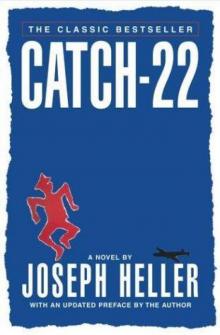 Catch-22
Catch-22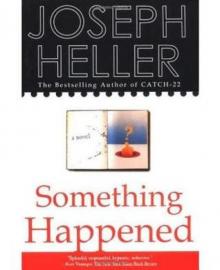 Something Happened
Something Happened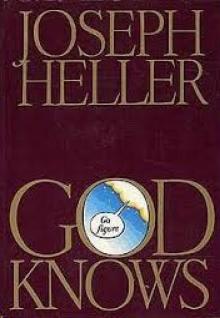 God Knows
God Knows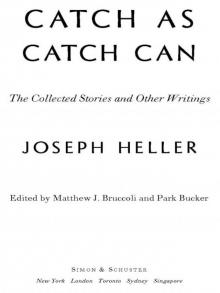 Catch As Catch Can
Catch As Catch Can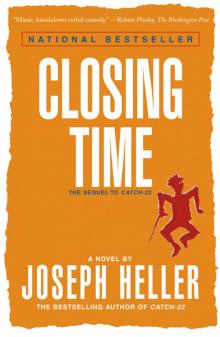 Closing Time
Closing Time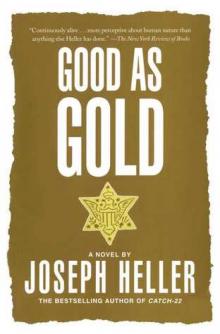 Good as Gold
Good as Gold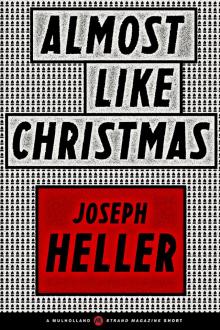 Almost Like Christmas
Almost Like Christmas